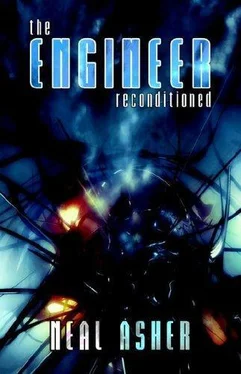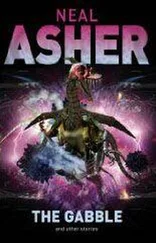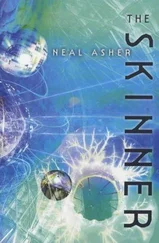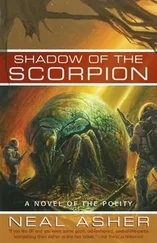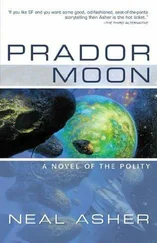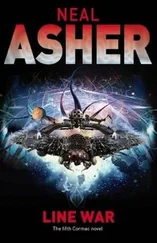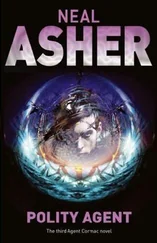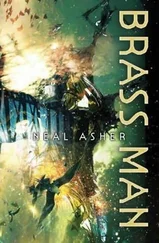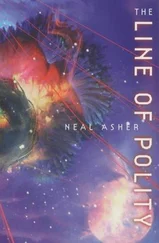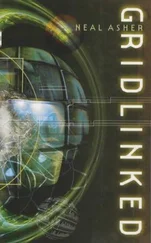Neal Asher - The Engineer Reconditioned
Здесь есть возможность читать онлайн «Neal Asher - The Engineer Reconditioned» весь текст электронной книги совершенно бесплатно (целиком полную версию без сокращений). В некоторых случаях можно слушать аудио, скачать через торрент в формате fb2 и присутствует краткое содержание. Год выпуска: 2006, ISBN: 2006, Издательство: Cosmos Books (PA), Жанр: Фантастика и фэнтези, на английском языке. Описание произведения, (предисловие) а так же отзывы посетителей доступны на портале библиотеки ЛибКат.
- Название:The Engineer Reconditioned
- Автор:
- Издательство:Cosmos Books (PA)
- Жанр:
- Год:2006
- ISBN:9780809556762
- Рейтинг книги:5 / 5. Голосов: 1
-
Избранное:Добавить в избранное
- Отзывы:
-
Ваша оценка:
- 100
- 1
- 2
- 3
- 4
- 5
The Engineer Reconditioned: краткое содержание, описание и аннотация
Предлагаем к чтению аннотацию, описание, краткое содержание или предисловие (зависит от того, что написал сам автор книги «The Engineer Reconditioned»). Если вы не нашли необходимую информацию о книге — напишите в комментариях, мы постараемся отыскать её.
,
,
,
,
and
.
The Engineer Reconditioned — читать онлайн бесплатно полную книгу (весь текст) целиком
Ниже представлен текст книги, разбитый по страницам. Система сохранения места последней прочитанной страницы, позволяет с удобством читать онлайн бесплатно книгу «The Engineer Reconditioned», без необходимости каждый раз заново искать на чём Вы остановились. Поставьте закладку, и сможете в любой момент перейти на страницу, на которой закончили чтение.
Интервал:
Закладка:
“This must be the place,” said Suen. There was something avid in her voice. Cheydar surveyed the dusty gloom and wondered at it. He had not been able to see much beyond the grey bulk of this place in the concealing trees, but it had not seemed to him to be of any great extent. The Proctor had gone to one side. He could hear it moving about. Suddenly there was light. Suen gasped. Eric swore.
“Nothing here,” said Cheydar. He turned to the Proctor for answers and saw that it just stood with its back to the wall, waiting, patient as a stone. Something stirred then. Air feathered his face. He turned, felt Eric’s fingers digging into his biceps, heard Suen moan with fright, felt his legs go weak and his stomach turn over.
“No Proctors here but Galeb,” said the apparition. “He stayed for whatever reasons Proctors have. His fellows went to other worlds, other civilizations, a long time ago. There is nothing here for you.” Cheydar could see Dagon in there; in the shape of the face, somewhat in the tone of the voice, but otherwise this could not be mistaken for anything less than the Owner himself. His eyes were pupil-less red, and he was pale like an albino, half-seen machines hung about him, were connected to him, plugged down into sockets in his head, neck and spine; his link with the ship and with the rest of a mind that had outgrown its human skull, his mind. He seemed solid, the machines less so. There was a feeling of power in the air, of forces bearing down on this point like mountains turned on their tips.
“You… the Owner,” said Suen.
Dagon, the Owner, looked at her and she flinched back.
“Didn’t you know that?” he asked.
“I thought… but you died.”
“Dagon is just an aspect of me, a part of me, the oldest part and a part not yet reintegrated else Ompotec would still be standing and the Cariphe’s garrison still living.”
The red fire, thought Cheydar, and felt a deep vicious satisfaction.
“What do you mean?” asked Suen.
“I do not interfere in human affairs,” said the Owner. “The Cariphe would not have lasted. The King of Elmarch was preparing to bring him down even as your husband burned… All part of the ebb and flow in the tide of human affairs.” There was a shimmer. Something changed. The machines became distant and Cheydar saw that the eyes were no longer red.
“But I do interfere in human affairs.” And it was Dagon speaking now; the man they had travelled with. He looked directly at Suen. “Proctors would have done no good, but this has, for you. When I died on the fence all that I was returned here to this.” He gestured behind him at the half-seen machines. “I held my integrity long enough to open the fence, to destroy the Cariphate. That I speak to you like this, now, is a boon my whole self grants. There will be more killing, Suen, when the army of Elmarch hunts down the last of the priest soldiers. But once the King has access to the mines around Ompotec, a new age will be born. You’ll see the start of that.” He turned to Eric. “Join the the Border Legion, like I said. You’ll do well there.” Finally he regarded Cheydar. “And you… do what you must. You are a good man, Cheydar.” There was pain then in Dagon’s face. The last he managed was, “I’ve been before, perhaps… sometime… ”
“Wait,” said Cheydar, and knew his request to be futile. The Owner was back, the eyes like a fire seen through rubies. The machines showing a solid face turned out from that other place where they were, somewhere above.
The Owner said, “That is all. Galeb will lead you to the fence. The death posts will be reactivated in the morning.”
“But you can’t—” began Suen, a note of righteousness in her voice that had Cheydar cringing. The Owner interrupted, “Suen, you are on my property. You have until morning not to be. Galeb will lead you and if you will not go he will kill you. That is all.”
Air dragged at them as it rushed to fill the space the Owner had occupied. Dagon had been there even at the end, but buried under layers of something ancient and frighteningly complex. Cheydar took Suen by the arm and led her out. Eric followed, trying not to grin at such adventure.
“We’ll go by the coast to Elmarch, find David and Sheda,” said Cheydar, wondering if Suen would ever be able to live.
“Yes,” she said, and leant against him. He shrugged her off and followed the grey shape of the Proctor into the dark.
ABOUT “THE TOR-BEAST’S PRISON”
Now onto the additions to this collection. The Tor-beast’s Prison was first published in Graeme Hurry’s excellent Kimota (issue 13, 2000), is an off-shoot of Cowl , but not the novel, the novella that came before it. I guess I have always liked time travel ever since hiding behind the settee when Dr Who was running away from those mobile dustbins. In a story-telling context, I love the self-referencing logic of it all and how very often the story arc can be tied into a loop. And now, proving that truth is sometimes stranger than fiction: I wrote Cowl (the novella) with its tors and its tor beast, before any publisher called Tor had even impinged on my consciousness. Strange how I am now being published in America by Tor and in Britain by Macmillan’s Tor UK imprint. A bit loopy really.
THE TOR-BEAST’S PRISON
I was in a park, it was spring and the birds were singing. The Earth was beneath my feet as was the black sphere; poised at the edge of the real. In two hours there would be another shift and then for the ensuing fifty hours and forty-three minutes I would be confined to that black surface below its metallic sky. I had two hours in which to feed myself, two hours of sunlight and human contact, two hours to acquire some luxuries. The money in my pocket would be of no use here unless I could get to a coin dealer. The last shift had put me down at the inception of the second Roman invasion of Britain, and I had taken the coins from the pouch of a legionary who had crawled into a briar patch to die, out of sight of the Iceni warrior who had split his gut. The head of the Emperor Claudius was impressed on them. A jogger came sweating and wheezing past me with a Walkman plugged into his ears. From his dress, and from that single electrical device, I guessed this time to be the late twentieth or early twenty-first century. This man was no use to me, for people did not often go jogging with money in their pockets. I scanned around and spotted a smartly-dressed man sitting on a park bench with a briefcase beside him. He was opening a sandwich box. I sauntered over and sat beside him.
“Morning,” I said.
He looked askance at me and I wondered if it was morning. I checked my surroundings. The jogger was fast disappearing and the only other people in view were a couple of teenagers near the park gates. Quickly then. I chopped him hard across the windpipe and felt cartilage give under the edge of my hand. Choking and clutching at his throat the man tried to rise. I knelt on the bench next to him and snapped his neck. As he shivered and convulsed into stillness I picked up his sandwich box and ate the contents. When I’d finished them, and the packet of crisps and apple, I searched him. His clothing yielded a fat wallet, cigarettes and a lighter, a pen knife, some change, and key ring from which depended a pencil torch. I lit a cigarette, following the same impulse that had made me eat the sandwiches — a hope that the other hunger would be staved off. The items I placed in the briefcase with the paperwork, pens, and scientific calculator, and then hurried from the park with it.
I try to remember when it started, but there is a haziness to my memory and a deal of inconsistency. I think I was born in the twenty-eighth century, but how is it I know things about later centuries? How is it I also know things BC that have never been written in history books? The frightening thought is that I have been to these times, experienced these things, and have been shifting for so long that I’ve simply forgotten. I would ask the sphere, but our communication is not a verbal thing. As I reached the shops, my watch, a complicated affair that has more functions than seem feasible, displayed the hour and ten minutes remaining to me. There I purchased a sleeping bag and a camp stove, dried food and coffee, whisky and bottled water, and other items to sustain me. I acquired some warm clothing — hiking gear and a body warmer — a rucksack which I packed full of anything of conceivable use. The nylon climbing rope I packed in last was for a very particular purpose. The only weapons available for purchase were a crossbow and a large sheath knife. I spent until the wallet was empty then, heavily burdened, headed back for the park. Whilst walking I smoked more cigarettes as the craving in me grew. By then it was getting dark and I realised how wrong I had been with my greeting to the man who still lay dead on the park bench. The teenagers were waiting for me inside the entrance to the park. Call it fate.
Читать дальшеИнтервал:
Закладка:
Похожие книги на «The Engineer Reconditioned»
Представляем Вашему вниманию похожие книги на «The Engineer Reconditioned» списком для выбора. Мы отобрали схожую по названию и смыслу литературу в надежде предоставить читателям больше вариантов отыскать новые, интересные, ещё непрочитанные произведения.
Обсуждение, отзывы о книге «The Engineer Reconditioned» и просто собственные мнения читателей. Оставьте ваши комментарии, напишите, что Вы думаете о произведении, его смысле или главных героях. Укажите что конкретно понравилось, а что нет, и почему Вы так считаете.
